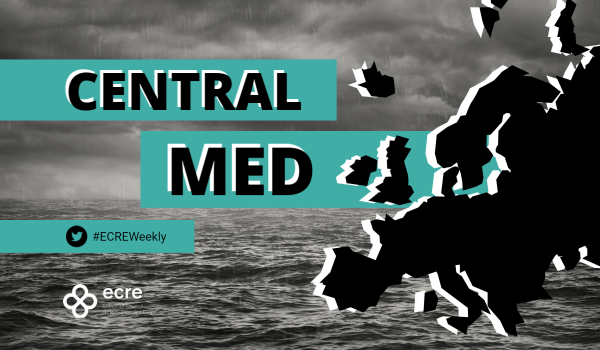While the Italian coast guard and civilian rescuers continue to save lives on the central Mediterranean, the death toll continues to rise. As Libyan authorities and the so-called coast guard use increasingly rogue tactics to prevent people reaching Europe, the European Border and Coast Guard Agency (Frontex) refuses access to information on cooperation. Refugees in Tunisia, who face forced labour and sex trafficking and are unable to access residency permits or long-term legal stays, have protested about the officer of the UN Refugee Agency (UNHCR).
The Italian coast guard and civilian search and rescue operators have saved hundreds of lives at the central Mediterranean over the past week. The Ocean Viking disembarked 247 survivors – including dozens of unaccompanied children – in Sicily on 19 and 20 February. The boat, which is operated by SOS Méditerranée, waited at sea in rough conditions for days while awaiting permission to drop anchor . On 19 February Sea-Watch 4 rescued 129 people in two separate operations off the coast of Libya. One of the vessels in distress was spotted by a Sea-Watch airplane that recently replaced the Moonbird plane that has supported “countless distress cases, documenting non-assistance and other state crimes”. On 22 February, the Italian coast guard rescued 573 people off Calabria found aboard “two overloaded fishing boats and left at the mercy of waves with unfavourable weather conditions that were expected to worsen significantly”. The group including 59 children was taken to port in Sicily while the body of a person, who according to survivors “had already been dead for a few days” was recovered. The International Organzation for Migration (IOM) recorded 123 people dead or missing on the Central Mediterranean in 2022 as of 19 February. The real number is likely significantly higher as many deaths go unreported.
The rogue behaviour of Libyan authorities and the so-called coast guard – notorious for links to militia and criminal networks – continues to provoke the ire of rights groups. On 18 February, IOM condemned “in the strongest terms the excessive use of force by the Libyan Stabilization Support Apparatus that resulted in the killing of one migrant and injury of several others during an interception operation”. The UN agency notes that:” This is not the first time migrants are shot by Libyan state actors. Previous tragedies occurred at sea, at disembarkation points and detention centres” and call for an immediate investigation of the incident and greater oversight of the Stabilization Support Apparatus. On 19 February the so-called Libyan coast guard engaged in dangerous maneuvers to capture a boat in the Maltese search-and-rescue zone. Five people ended up in the water. UNHCR special envoy for the Western and Central Mediterranean Vincent Cochetel stated: “the dangerous interception in the Maltese SSR on Sunday by the LCG could also have claimed lives of people fleeing hellish conditions in Libya”. On 20 February 68 people including at least three children were intercepted in Maltese waters and returned to face detention in Libya. Like thousands of others they will face conditions and abuse that qualify as crimes against humanity. Many are subject to arbitrary expulsion: between 2019 and 2020 the UN reported more than 7,500 expulsions to Sudan, Niger and Chad. The actual number of people expelled and potentially lost in the Sahara desert remains unknown as it virtually impossible to account for such incidents and their consequences. EU and member state complicity in rights abuses in Libya has been widely documented, including Frontex cooperation with the country’s coast guard. The EU agency however, continues to cover up details of its cooperation, refusing to release documents for scrutiny by MEPs. According to IOM 32,425 people were intercepted and returned to Libya in 2021 and 1,721 so far in 2022 as of 12 February.
People on the move in Tunisia are protesting alleged mistreatment by UNHCR and a lack of evacuation from the country. Recently the Tunisian Association for the Support of Minorities and the Tunisian Association of Sub-Saharan Students held a press conference to denounce recent arbitrary arrests and detention of more than 300 foreign students of sub-Saharan origin reported based on their skin color alone. According to the Vatican, migrants and refugees in the country face forced labour and sex trafficking and are unable to access residency permits or long-term legal stays, leaving them stuck as they are “unable to pay the penalties upon departure for each week of their illegal overstay”. Nearly 200 people, of mainly sub-Saharan origin, attended a sit-in protest outside two UNHCR offices in Zarzis and Medenine from 10 February. The protesters demand evacuation and accuse UNHCR of mistreatment. They claim they have refugee status but are not provided with any support and were living in “inhumane” conditions. The protests, which was ongoing after eight days, is supported by Alarm Phone, Borderline Sicilia, Migreurop, Refugee Rescue, Sea-Watch and a range of other organisations. According to UNHCR, a total of 9,374 refugees and asylum seekers are registered in Tunisia, 3,920 of whom had been registered in 2021. That year, just 76 people departed Tunisia for resettlement in third countries.
For further information:
- ECRE, Central Med: Rescues Continue as Malta is Called Out for Preventing Disembarkation and Conducting Pushbacks to Libya Whose ‘Coast Guard’ Again Faces Scrutiny, February 2022
- ECRE, Central Med: EU Boosts Support to Libya Amid Detainee Hunger Strike, Activists Protest Deaths at Sea, Cyprus Pushes for Returns, El Hiblu 3 Trial Continues, February 2022
This article appeared in the ECRE Weekly Bulletin. You can subscribe to the Weekly Bulletin here.

